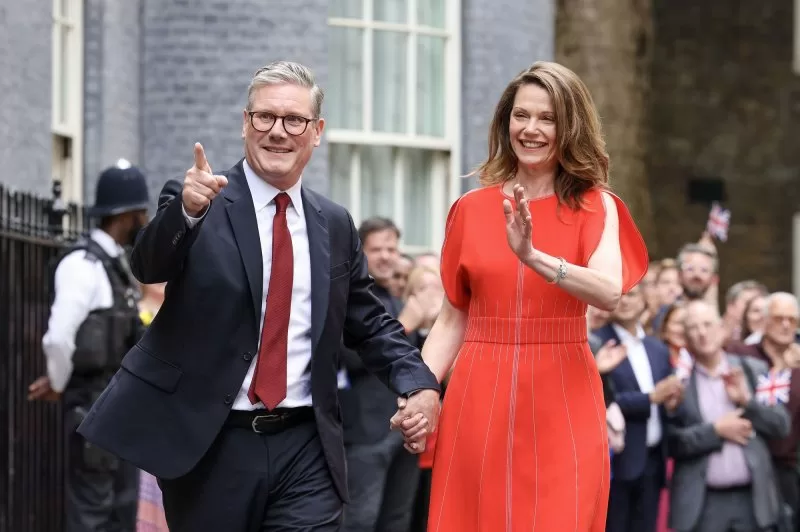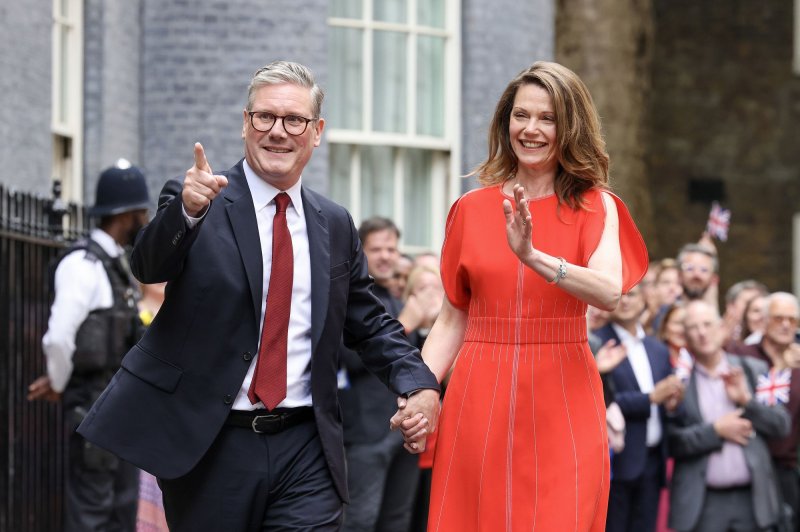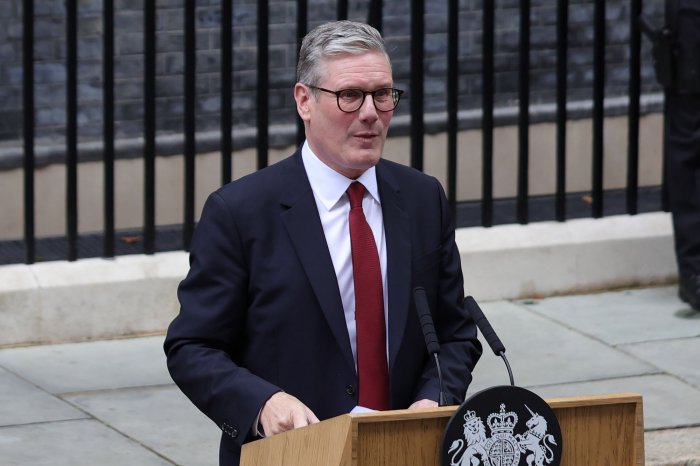1 of 4 | Prime Minister Keir Starmer and his wife, Victoria, arrive at Number 10 Downing Street in London, ahead of delivering his first speech to the nation as the head of government. Photo by Rory Arnold/No 10 Downing Street/UPI |
License PhotoJuly 5 (UPI) — Britain’s Labor Party won a landslide victory Friday in a general election that saw the ruling Conservative Party of Prime Minister Rishi Sunak swept from power after 14 years in government.
With votes counted in 648 of 650 parliamentary seats, the Labor party had a majority of around 170 after winning 412 seats to the Conservatives’ 121, sweeping large areas across the country, including in Scotland and Wales.
Labor leader Keir Starmer was at Buckingham Palace in London mid-morning for an audience with King Charles, in which the monarch invited him to form a new government led by him.
The brief meeting is formally recorded in the Court Circular as the “kissing of hands,” at which prime ministers traditionally kiss the ringed finger of the monarch in allegiance, although Friday’s ceremony more likely will have featured a bow and a brisk handshake.
The ceremony is a first for both men — for Starmer being anointed leader of the country and for Charles appointing a prime minister after a general election, something his late mother, Queen Elizabeth II, performed no fewer than 18 times during her 70-year reign.
Minutes earlier Sunak had tendered his resignation as prime minister and First Lord of the Treasury to the King after losing at least 244 of the 365 seats his party won in the 2019 election. According to convention, he then recommended to the king that Starmer form a new government.
Starmer is expected to take up residence at 10 Downing Street and appoint his cabinet before the end of the day. The new parliament will meet Tuesday to elect a new speaker ahead of the State Opening of Parliament on July 17, at which “The King’s Speech” — setting out the government’s program — is read to the House of Commons.
The speech is actually written by the government, not the king.
“We did it. Change begins now,” Starmer said in his acceptance speech in his London constituency of Holborn and St. Pancras.
“Across our country, people will be waking up relieved. Now we can look forward in to the morning. The sunlight will be shining strong through the day on a country which, after 14 years, has an opportunity to get its future back.
“People here and around the country have spoken and they are saying they’re ready for change. To end the politics of performance, and return to politics as public service.”
“You have voted, it is now time for us to deliver,” he said before thanking campaigners for their support and hard work.
Sunak held onto his North Yorkshire seat but a dozen high-profile members of his cabinet and several senior Conservatives, including his predecessor Lis Truss, lost theirs in the worst election result in the party’s 189-year history.
Speaking outside No. 10 before heading to the palace to resign he said he took responsibility for the outcome telling the country simply: “I am sorry.”
“I have given this job my all, but you have sent a clear signal that the government of the United Kingdom must change. I have heard your anger, your disappointment and I take responsibility for this loss.”
He also apologized to supporters and campaigners who he said had “worked tirelessly but without success,” saying he was sorry he had failed to deliver the result their efforts deserved.
In addition to winning back so-called “red-wall” seats in Northern England that turned Conservative in 2019 to support former Prime Minister Boris Johnson‘s pledge to “Get Brexit done,” Labor also made a big comeback in Scotland, where it had been locked out by the Scottish National Party party for almost a decade.
The SNP’s share of seats was slashed to just nine, down from 47.
However, turnout was down at 60% and Labor’s landslide came from just 33.7% of the vote, a gain of only 1.6% from 2019 when it suffered one of its largest-ever electoral defeats.
But the Labor Party has been handed a mandate, matched only by that received by the Labor administration of former Prime Minister Tony Blair in 1997, to deliver on six pledges it campaigned on as the first actions it would take in office.
They are: Deliver economic stability; cut waiting times in the National Health Service; launch a new border security command to tackle illegal migration in place of plans to deport migrants to Rwanda; establish Great British Energy to invest in green energy technology; cracking down on antisocial behavior; and recruit 6,500 new teachers.
Nigel Farage’s Reform UK party made large gains, taking millions of votes from the Conservatives and with Farage overturning a 25,000 majority in Clacton on the Essex coast to win a seat in parliament after seven failed attempts.
However, despite winning more than 14% of the vote, up from 2% in 2019, the right-wing party won just four seats due to the first-past-the-post system which meant that while it came second in many races those votes did not benefit their final showing.
The centrist Liberal Democrat party, which garnered just 12.2% of the vote, won 71 seats up from eight in the last parliament.
In Northern Ireland, the nationalist Sinn Fein became the largest party, retaining its seven parliamentary seats while the Democratic Unionist Party, which opposes reunification with the Republic of Ireland, lost three of its eight seats.
Newly appointed British Prime Minister Keir Starmer delivers his first speech to the nation outside No.10 Downing Street in London on July 05, 2024. Photo by Hugo Philpott/UPI |
License Photo


